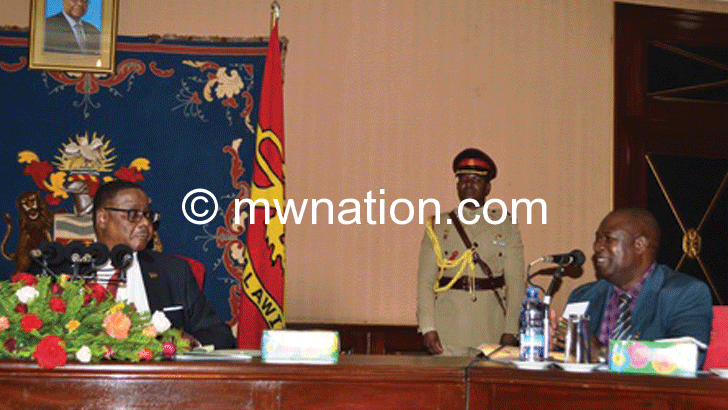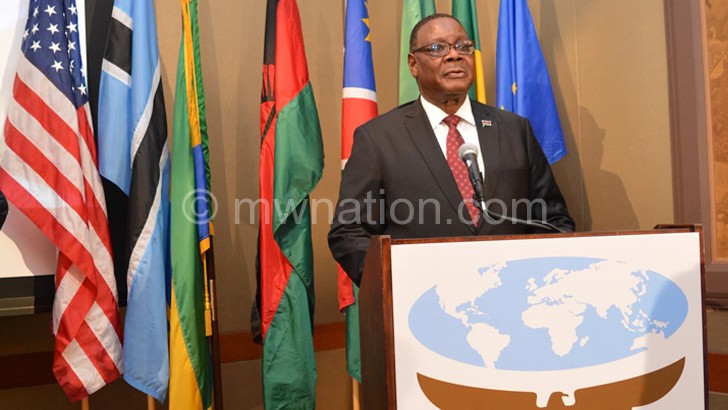APM adamant on ATI bill changes
Stalemate. That is how a meeting between President Peter Mutharika and the media in Lilongwe ended on Thursday as the President merely reiterated his promise to table the Access to Information (ATI) Bill.
During the meeting at Kamuzu Palace, where he met media owners and managers, the President assured the media in the country of his protection and cooperation, but adamantly declined to back down on his decision to remove ‘inconsistent’ provisions in the draft law.

Mutharika has not given an indication of when the bill would go to Parliament, but the Cabinet Committee on Legal Affairs is expected to meet by the second week of February.
Media Council of Malawi (MCM), Media Institute of Southern Africa (Misa) Malawi Chapter alongside media managers from Nation Publications Limited (NPL), Times Group, Zodiak Broadcasting Station (ZBS), Malawi Institute of Journalism (MIJ), Nkhotakota Community Radio, Capital Radio and Joy Limited met the President with the tabling of the ATI Bill dominating the agenda.
Speaking on behalf of the delegation, MCM chairperson Wiseman Chijere Chirwa, a professor at the University of Malawi’s Chancellor College, stressed to the President the importance of ATI legislation in fostering accountability, reducing corruption and removing mistrust between government and its citizens.
He asked Mutharika to clearly explain to Malawians and various stakeholders his reservations with the bill in its draft form and reject any attempts at adulterating it, especially on the establishment of an Independent Information Commission which would be responsible for oversight of the legislation.

Said Chijere Chirwa: “The right of access to information protects and promotes the collective good in a country. It is an integral part of human rights. We, therefore, request you as custodian of the Constitution to ensure that this bill is tabled during this March sitting of Parliament.”
In his response to the appeal, Mutharika said while he remained committed to the spirit of the ATI Bill as promised in his Democratic Progressive Party (DPP) manifesto in 2014, he would not accept ultimatums from proponents of the legislation, whether donors or civil society.
He said he would not assent to the ATI Bill if Parliament reintroduced provisions he deemed unacceptable.
The provisions in question are Section 6(2), which invalidates any other laws that restrict the disclosure of information and restricts future Parliaments from passing laws which restrict the rights and obligations of the ATI law.
The President also frowns at Section 3(1), which states that people could demand information which came into existence before the law was enacted.
Said the President: “Parliament is sovereign and this provision is unacceptable. This provision [Section 6(1)] is out and it can never be part of the law as long as I am President of this country.”
Misa-Malawi board member Mandala Mambulasa’s explanation that binding future Parliaments from tampering with the right to know was a standard provision in the African Union (AU) model law on access to information fell on deaf ears.
“Unless we are saying all those processes were wrong, we are effectively saying the right to information will be removed in the future,” Mambulasa, a private practice lawyer, told the President.
However, Minister of Justice and Constitutional Affairs Samuel Tembenu, agreeing with Mutharika, said ATI was a derogable right which could be restricted and the AU model law was merely setting a precedent for member States, but could be rejected.
He added that Cabinet also had reservations with the establishment of an Independent Information Commission and government has instead proposed Malawi Human Rights Commission (MHRC) to take up the responsibility.
Both Mutharika and Tembenu did not indicate when the bill would be tabled.
However, in November 2015, Minister of Finance, Economic Planning and Development Goodall Gondwe told Parliament the ATI Bill would be passed by March 31 2016 to beat the deadline set by the European Union (EU) as one of the conditions for the resumption of direct budgetary support to Malawi.
Still in November 2015, EU and the World Bank had asked Malawi to meet 20 conditionalities, including tabling the ATI Bill, if they are to resume direct budget support.
Mutharika’s administration has come under fire from various stakeholders, including media owners, managers, civil society and donors, for failing to table the ATI Bill.n





